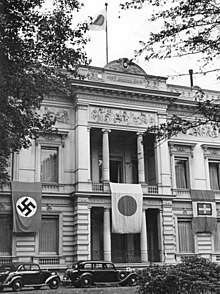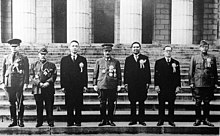
Back Spilmoondhede Afrikaans دول المحور Arabic دول المحور ARZ Potencies de la Exa na Segunda Guerra Mundial AST Berlin-Roma-Tokio oxu Azerbaijani میحور دؤولتلری AZB Краіны Восі Byelorussian Краіны Восі BE-X-OLD Страни от Оста Bulgarian দ্বিতীয় বিশ্বযুদ্ধে অক্ষশক্তি Bengali/Bangla
Axis powers | |
|---|---|
| 1936–1945 | |
 Celebration of the signing of the Tripartite Pact in Tokyo
| |
| Status | Military alliance |
| Historical era | World War II |
| 25 November 1936 | |
| 22 May 1939 | |
| 27 September 1940 | |
• Defeated | 2 September 1945 |
Footnotes
| |




The Axis powers,[nb 1] originally called the Rome–Berlin Axis[1] and also Rome–Berlin–Tokyo Axis, was a military coalition that initiated World War II and fought against the Allies. Its principal members were Nazi Germany, Fascist Italy and the Empire of Japan. The Axis were united in their far-right positions and general opposition to the Allies, but otherwise lacked comparable coordination and ideological cohesion.
The Axis grew out of successive diplomatic efforts by Germany, Italy, and Japan to secure their own specific expansionist interests in the mid-1930s. The first step was the protocol signed by Germany and Italy in October 1936, after which Italian leader Benito Mussolini declared that all other European countries would thereafter rotate on the Rome–Berlin axis, thus creating the term "Axis".[2] The following November saw the ratification of the Anti-Comintern Pact, an anti-communist treaty between Germany and Japan; Italy joined the Pact in 1937, followed by Hungary and Spain in 1939. The "Rome–Berlin Axis" became a military alliance in 1939 under the so-called "Pact of Steel", with the Tripartite Pact of 1940 formally integrating the military aims of Germany, Italy, Japan, and later followed by other nations. The three pacts formed the foundation of the Axis alliance.[3]
At its zenith in 1942, the Axis presided over large parts of Europe, North Africa, and East Asia, either through occupation, annexation, or puppet states. In contrast to the Allies,[4] there were no three-way summit meetings, and cooperation and coordination were minimal; on occasion, the interests of the major Axis powers were even at variance with each other.[5] The Axis ultimately came to an end with its defeat in 1945.
Particularly within Europe, the use of the term "the Axis" sometimes refers solely to the alliance between Italy and Germany, though outside Europe it is normally understood as including Japan.[6]
Cite error: There are <ref group=nb> tags on this page, but the references will not show without a {{reflist|group=nb}} template (see the help page).
- ^ Goldberg, Maren; Lotha, Gloria; Sinha, Surabhi (24 March 2009). "Rome-Berlin Axis". Britannica.Com. Britannica Group, inc. Retrieved 11 February 2021.
- ^ Cornelia Schmitz-Berning (2007). Vokabular des Nationalsozialismus. Berlin: De Gruyter. p. 745. ISBN 978-3-11-019549-1.
- ^ Cooke, Tim (2005). History of World War II: Volume 1 – Origins and Outbreak. Marshall Cavendish. p. 154. ISBN 0761474838. Retrieved 28 October 2020.
- ^ Tucker, Spencer; Roberts, Priscilla Mary (2005). Encyclopedia of World War II A Political, Social and Military History. ABC-Clio. p. 102. ISBN 9781576079997. Retrieved 13 February 2021.
- ^ Momah, Sam (1994). Global strategy : from its genesis to the post-cold war era. Vista Books. p. 71. ISBN 9789781341069. Retrieved 13 February 2021.
- ^ Cite error: The named reference
Hedinger1was invoked but never defined (see the help page).